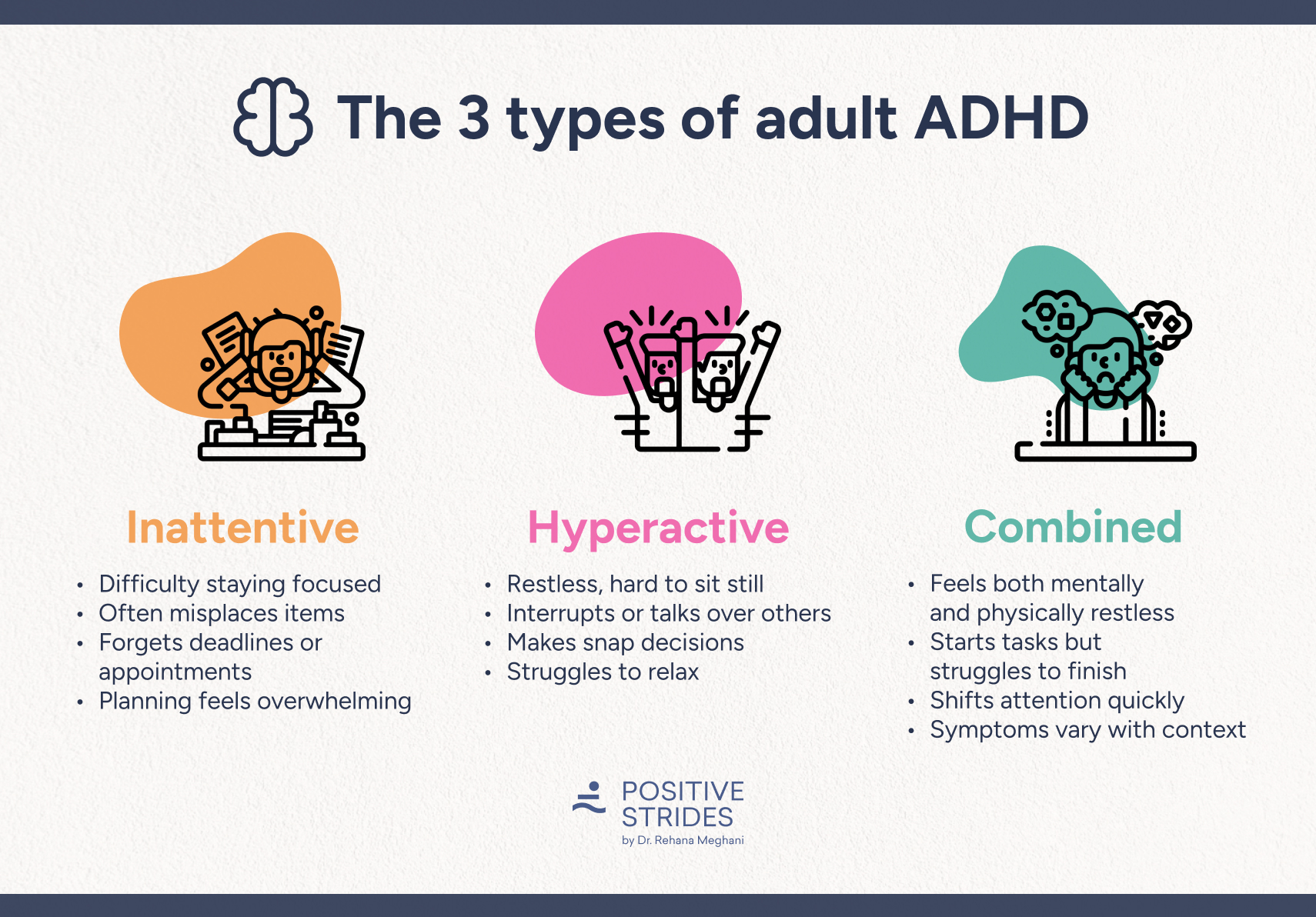Many adults wonder why staying focused, keeping organized, or managing time always feels harder for them than it seems to for others. In some cases, ADHD may be the reason. Research suggests that around 3% of Canadian adults have it — but without a proper ADHD assessment, these struggles are often mistaken for stress, anxiety, or personality quirks.
This article explains what ADHD is, the key symptoms of ADHD in adults, the different types of ADHD, and what to expect from getting an ADHD test as an adult.
What is ADHD?
Attention-Deficit/Hyperactivity Disorder (ADHD) is a neurodevelopmental condition that affects focus, impulse control, and energy levels. It’s often incorrectly assumed to be just a childhood condition, but it frequently continues into adulthood. Many adults were never diagnosed as children and only seek help later in life when symptoms begin to affect work, relationships, or mental health.
An ADHD diagnosis can be complex because symptoms often overlap with conditions such as anxiety, depression, or trauma. These overlaps can be clarified during professional ADHD testing with a licensed psychologist.
What are the symptoms of ADHD in adults?
ADHD in adults can look different from one person to the next. While experiences vary, common patterns include:
- Difficulty focusing on tasks, especially boring or repetitive work
- Forgetfulness, such as misplacing items or missing deadlines
- Disorganization at home, work, or in planning daily life
- Procrastination or trouble starting and finishing projects
- Impulsivity, such as interrupting or making quick decisions without considering consequences
- Restlessness or difficulty relaxing, even during downtime
- Emotional regulation struggles, such as frustration or irritability
This is not an exhaustive list, and having these traits alone does not automatically mean you have ADHD.
Do I have ADHD?
After recognizing some symptoms of ADHD in themselves, many people search for “do I have ADHD?” quizzes, hoping for clarity. Free, online resources like our ADHD self-reflection tool can be a useful starting point, but it’s important to note that these resources cannot provide a true ADHD diagnosis.
The only way to know for sure is through a professional adult ADHD test. These assessments go beyond a simple checklist and typically include:
- Detailed history taking: your school, work, and personal background
- Validated questionnaires (e.g., ASRS, SNAP-IV)
- Diagnostic clarification: exploring overlaps with anxiety, depression, or trauma, and ruling out other possible explanations
This multi-step process ensures your {ADHD testing} results are accurate and comprehensive.
What type of ADHD do I have?
Knowing the type of ADHD you have is essential for tailoring support strategies, whether that means therapy, coaching, lifestyle adjustments, or medical treatment. A professional ADHD assessment helps identify which type applies:

Inattentive type ADHD (or ADD)
Sometimes called “ADD,” inattentive ADHD is most commonly recognized by challenges with focus, memory, and organization.
Adults with inattentive ADHD may:
- Struggle to stay focused during meetings or conversations
- Frequently lose items like keys, phones, or paperwork
- Miss deadlines or forget appointments
- Find it hard to organize daily responsibilities or plan ahead
Hyperactive-impulsive type ADHD
Contrary to its name, adults with hyperactive-impulsive ADHD may not appear “hyper” in the same way or to the same extent that children do, but the symptoms still affect daily life.
Adults with Hyperactive-Impulsive ADHD may:
- Feel restless or unable to sit still for long periods
- Talk excessively or interrupting others in conversation
- Make quick decisions without fully considering consequences
- Struggle to relax, even during downtime
- Feel driven by internal restlessness or agitation
Combined type ADHD
The combined type is the most common ADHD diagnosis in adults. It includes both inattentive and hyperactive-impulsive symptoms.
Adults with combined ADHD may:
- Struggle to focus and complete tasks
- Frequently misplace items or miss deadlines
- Interrupt others or act impulsively
- Experience both mental and physical restlessness
You can read more about how undiagnosed ADHD may show up differently in men and women in one of our other blog posts.
What should I expect during an ADHD assessment?
Today, many clinics offer online ADHD assessment options, making the process more accessible. These assessments are conducted by licensed psychologists and follow evidence-based guidelines. The steps mirror in-person evaluations but are completed virtually, often through secure video sessions and online questionnaires.
For a full step-by-step breakdown of the process, check out our Complete ADHD Assessment Guide so you’ll know exactly what to expect and can move forward with confidence.
How do I take the first step toward an ADHD diagnosis?
If you’ve been asking yourself, “Do I have ADHD?” it may be time to get clear answers. A professional ADHD assessment with Dr. Rehana Meghani can give you the clarity you’ve been looking for, and the next steps to move forward.
With over 10 years of experience, Dr. Meghani specializes in ADHD testing for adults and trauma-informed therapy. She offers online assessments in Alberta & Yukon, combining neuroscience, psychology, and compassionate care.
Alongside a tailored diagnosis, she works with you to create a personalized plan so you can move forward with confidence.
